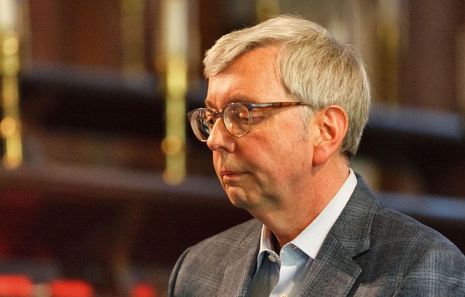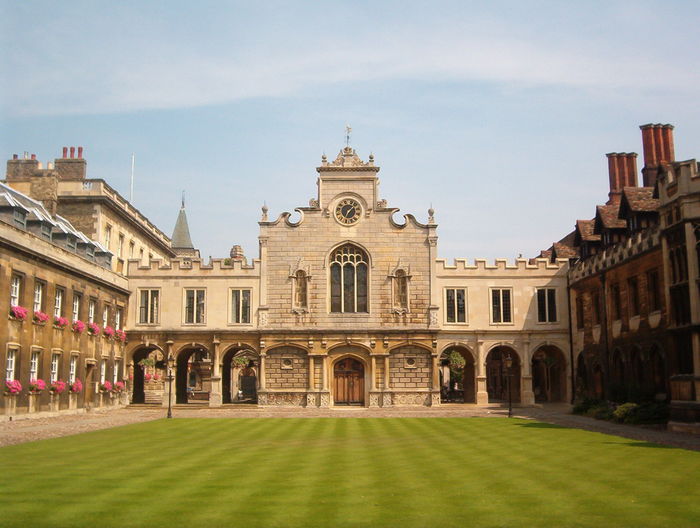Toope joins Union panel to discuss impact of coronavirus on education
Vice-Chancellor Stephen Toope engaged with economists and former government ministers to consider a post-pandemic future for education

Wednesday’s (20/05) Union event saw five panellists, including Vice-Chancellor Stephen Toope, exploring the future of traditional education in light of the coronavirus pandemic, a day after news broke that lectures would take place online for the next academic year.
Economist Alex Tabarrok and former Conservative ministers Justine Greening and David Willetts considered online education to be the future of higher education; whilst Vice-Chancellor of Cambridge Stephen Toope and former President of Princeton University Shirley Tilghman expressed hope for the continuation of traditional forms of education, albeit enriched by digitalisation.
Stephen Toope began by congratulating the Union for “moving so nimbly into this new era” with its online Easter Term programme. He emphasised that despite the “tremendous disruption” to higher education caused by the covid-19 pandemic, the Cambridge collegiate experience of “small communities with a feeling of belonging” would not be changing fundamentally.
Asserting that “our colleges will remain open”, he outlined the various ways in which face-to-face contact would still be maintained despite the decision to move lectures online. In this, he pointed to a continuation of sport, music and debating, as well as of the services provided by tutors, counsellors, nurses and chaplains.
Emphasising the strength of traditional educational models, he argued that the current university experience is “transformative” in its combination of educational and social elements, and that the social experience gained is a highly significant aspect.
Educational Inequalities
Toope also expressed a fear that the coronavirus crisis would deepen educational inequalities both in the UK and other countries, particularly with regards to online provisions for school students this term. He declared his intent to “redouble online outreach programmes” and increase Cambridge’s efforts to help students in “less privileged environments”.
The Vice-Chancellor also went on to speak about the opportunities provided by improvements in online learning, and how the current crisis might lead to a global re-evaluation of higher education, as there was “no single model of what a university should be”.
He spoke favourably of a “blended” approach that would “take the best of collegiate Cambridge and catapult it into the 21st century”, echoing the words of Pro-Vice-Chancellor Graham Virgo in his discussion with Varsity after news of the move to online lectures broke.
Tilghman largely shared Toope’s views, expressing an optimistic outlook on the consequences of Covid-19 in higher education. She argued that traditional education would not be significantly affected in the long-term, despite the current disruption, and that online learning would improve a great deal as a result of the coronavirus crisis. She assured students watching that “Cambridge as you know it will resume”.
Speakers Alex Tabarrok and David Willetts spoke in favour of a ‘massification’ of online education. Tabarrok, an economist and founder of the free online Marginal Revolution University, stated online education was “cheaper and better” than face-to-face education.
He furthered that he is looking forward to the day “education on demand” will be developed in the same model as video on demand. This would allow for university education to reach a larger public as well as “non-traditional students” like adults with children. He dismissed the worry that online education might be socially isolating, stressing that social media and gaming has demonstrated that digital communities can form.
Toope disputed this point, arguing that the lack of face-to-face education would create a “greater sense of isolation” and have adverse effects on student mental health.
Online Teaching
David Willetts, former Conservative Minister of State for Universities and Science, agreed with Tabarrok that the future of education is to be found in online learning. He stressed that this was the only way to answer the demand for higher education in developing economies where, according to him, lack of infrastructure prevents residential learning experiences.
Willets said he would find it “fascinating” if online education brought about a form of desintermediation where individuals could follow courses affiliated with no University.
Both saw a divergent path between the future of education in institutions like Cambridge and Princeton, which would be more likely to survive in their traditional form, and smaller universities that would increasingly turn to online education.
Toope voiced disagreement with the idea of there being a “dichotomy” between universities like Cambridge and others, asserting it was in the best interest of all that online education progress rapidly all the while in-person experiences are maintained whenever possible.
The final speaker, former Conservative MP and Education Secretary Justine Greening, broadly agreed with Tabarrok and Willetts that the coronavirus crisis would lead “steadily, probably quite quickly” to a move towards online education. She stated that “there’s a challenge to universities but it’s a positive one” and should be “embraced” by higher education organisations.
She went on to suggest that a “Zoom business world” might be more fair than one conducted face-to-face, as “whether you can get your points across” as “punchily” as possible would become more important than “who you know”. In her opinion, making provision for online education now might help constitute a “resilience strategy” in the case of potential future pandemics.
Toope concluded the panel discussion by arguing that we should not place online and traditional forms of education in opposition to one another. He emphasised the need not to “denigrate” traditional models of education while still embracing new opportunities for online education.
A full video of the debate is available on the Cambridge Union YouTube page.
 News / Hundreds of Cambridge academics demand vote on fate of vet course20 February 2026
News / Hundreds of Cambridge academics demand vote on fate of vet course20 February 2026 News / University Council rescinds University Centre membership20 February 2026
News / University Council rescinds University Centre membership20 February 2026 News / Judge Business School advisor resigns over Epstein and Andrew links18 February 2026
News / Judge Business School advisor resigns over Epstein and Andrew links18 February 2026 News / Petition demands University reverse decision on vegan menu20 February 2026
News / Petition demands University reverse decision on vegan menu20 February 2026 News / Caius students fail to pass Pride flag proposal20 February 2026
News / Caius students fail to pass Pride flag proposal20 February 2026










